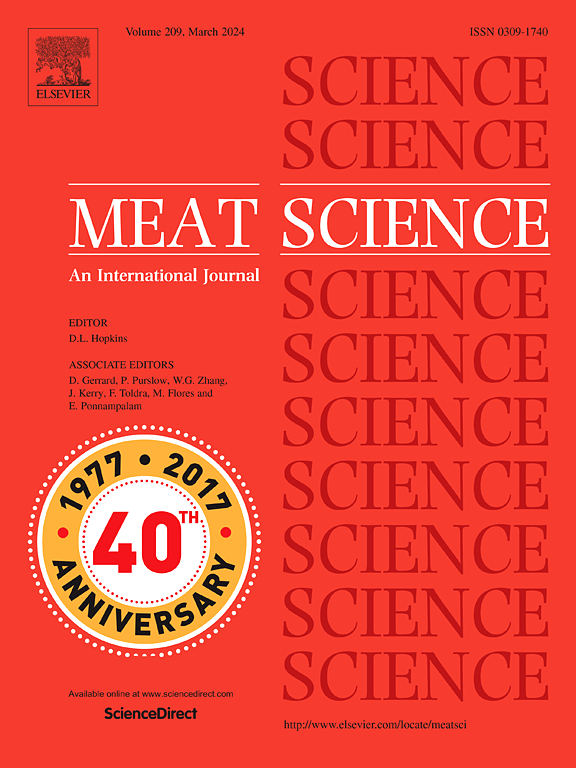Effects of dietary Inonotus obliquus fermentation products supplementation on meat quality and antioxidant capacity of finishing pigs
IF 6.1
1区 农林科学
Q1 Agricultural and Biological Sciences
引用次数: 0
Abstract
This study aimed to investigate the supplementation of finishing pigs with Inonotus obliquus fermentation products (IOFP) on the meat quality, amino acid and fatty acid composition, muscle fiber characteristics, and antioxidant capacity. Eighteen healthy castrated piglets were randomly divided into three groups and fed a basal diet or supplemented with IOFP (obliquus (Chaga fungus) products fermented for 3 or 7 days (IOFP-3 and IOFP-7) at 8 g per kg feed). The results demonstrated that, compared to the control group, IOFP significantly increased the pH24h from 5.44 to 5.52, a* value from 3.8 to 4.5, crude protein content from 21.9 % to 24.0 %, and intramuscular fat content from 3.03 % to 3.56 %. Additionally, IOFP led to significant increases in the content of total amino acids (TAA), essential amino acids (EAA), flavor amino acids, total polyunsaturated fatty acids (PUFA), and the percentage of unsaturated fatty acids (P < 0.05). Furthermore, it resulted in a significant decrease 45.3 N to 40.3 N in shear force (P < 0.05) in the Longissimus thoracis et lumborum (LTL) muscle of pigs. IOFP-7 supplementation also increased (P < 0.05) the MyHC I mRNA expression and decreased (P < 0.05) MyHC IIb mRNA levels. IOFP not only increased superoxide dismutase (SOD) (P < 0.05) in the serum and muscle tissue, but also decreased the content of MDA (P < 0.05) in serum. IOFP-7 supplementation significantly increased enzyme activity and enhanced the expression of Nuclear factor E2-related factor 2 (Nrf2) and downstream genes (P < 0.05), and reduced MDA and carbonyl contents of pork during storage in high‑oxygen modified atmosphere packaging. In summary, this study demonstrated that dietary IOFP supplementation can effectively improve pork's color and nutritional value, increase slow-twitch fiber percentage, enhance the antioxidant capacity of pigs, prevent lipid and protein oxidation, and improve pork quality.
饲粮中添加斜奶油发酵产物对育肥猪肉品质和抗氧化能力的影响
本试验旨在研究在育肥猪饲粮中添加斜牛菇发酵产物(IOFP)对肉质、氨基酸和脂肪酸组成、肌纤维特性和抗氧化能力的影响。选取18头健康阉割仔猪,随机分为3组,分别饲喂基础饲粮或在基础饲粮中添加发酵3 d或7 d的Chaga菌产品(IOFP-3和IOFP-7,每kg饲料8 g)。结果表明,与对照组相比,IOFP显著提高了pH24h从5.44提高到5.52,a*值从3.8提高到4.5,粗蛋白质含量从21.9%提高到24.0%,肌内脂肪含量从3.03%提高到3.56%。此外,IOFP还显著提高了总氨基酸(TAA)、必需氨基酸(EAA)、风味氨基酸、总多不饱和脂肪酸(PUFA)含量和不饱和脂肪酸百分比(P <;0.05)。剪切力从45.3 N显著降低至40.3 N (P <;0.05)在猪胸腰最长肌(LTL)中存在差异。IOFP-7的补充也增加了(P <;0.05) MyHC I mRNA表达降低(P <;0.05) MyHC IIb mRNA水平。IOFP不仅增加了超氧化物歧化酶(SOD) (P <;血清和肌肉组织中MDA含量显著降低(P <;0.05)。补充IOFP-7可显著提高酶活性,增强核因子e2相关因子2 (Nrf2)及下游基因(P <;0.05),并降低了猪肉在高氧修饰气氛包装中储存期间的丙二醛和羰基含量。综上所述,饲粮中添加IOFP可有效改善猪肉色泽和营养价值,提高慢肌纤维比例,增强猪抗氧化能力,防止脂肪和蛋白质氧化,改善猪肉品质。
本文章由计算机程序翻译,如有差异,请以英文原文为准。
求助全文
约1分钟内获得全文
求助全文
来源期刊

Meat Science
工程技术-食品科技
CiteScore
12.60
自引率
9.90%
发文量
282
审稿时长
60 days
期刊介绍:
The aim of Meat Science is to serve as a suitable platform for the dissemination of interdisciplinary and international knowledge on all factors influencing the properties of meat. While the journal primarily focuses on the flesh of mammals, contributions related to poultry will be considered if they enhance the overall understanding of the relationship between muscle nature and meat quality post mortem. Additionally, papers on large birds (e.g., emus, ostriches) as well as wild-captured mammals and crocodiles will be welcomed.
 求助内容:
求助内容: 应助结果提醒方式:
应助结果提醒方式:


